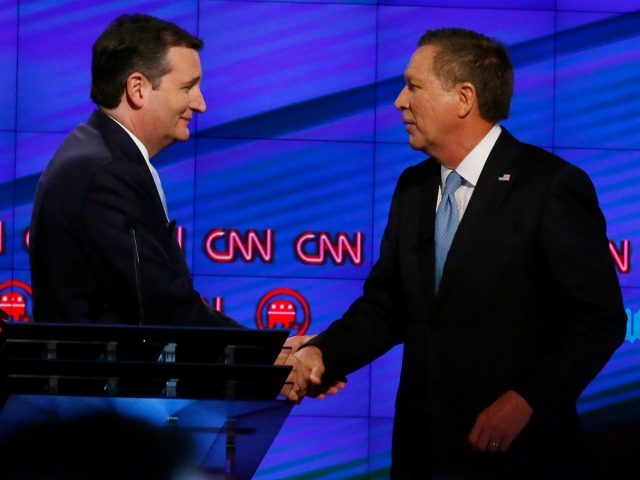The Sen. Ted Cruz and Gov. John Kasich campaigns may be working together, or they may not.
Both parties agreed this week that Cruz would focus on competing against Donald Trump in next Tuesday’s Indiana primary, and that Kasich would zero in on the May 17 primary in Oregon and the June 7 primary in New Mexico. The move drew GOP front runner Trump’s ire, but election law experts tell Breitbart News it is legal.
“These statements are by the campaigns, and while they clearly signal their supporters (including Super PACs), they do not appear on their face to violate the FEC’s coordination rules—because the rules are so porous and full of loopholes!” Trevor Potter, a former Commissioner and Chairman of the Federal Election Commission and partner at Caplin & Drysdale, tells Breitbart News.
“If the campaigns called the Super PACs and told them where to run the ads,” Potter continues, “it would be a problem—but a public announcement the PACs hear, without a specific request to the PAC in the announcement—is not covered by the current hopeless rules.”
“They do not,” former FEC associate general counsel Kenneth Gross tells Breitbart News, when asked if the statements cross the line of what is acceptable conduct and what is “illegal coordination” between a campaign and a Super PAC.
“What you are asking about here is public messaging, or signaling, between official campaigns and the Super PACs which support them,” Robert Higdon, a partner at Williams Mullen who specializes in federal election law tells Breitbart News:
Clearly the law prohibits quid pro quo coordination where there is direct interaction between the campaign and the PAC. The type of messaging you are asking about, however, permits the campaign and the PAC to track each other without the prohibited direct contact. The goals are implicit in the message; but the means used to communicate those goals involve no direct exchange. This type of coordination is used by candidates on both sides of the isle and at every level of Government. It is limited only by the imagination of the operatives involved and the technology they use (the public airwaves, websites, twitter, Facebook, etc.) The result is a real dissonance between what is perceived to be coordination and what is actual coordination under the law.
While the statements made by the campaigns you referenced below give the appearance of coordination, neither federal law nor the decisions of the Federal Election Commission clearly prohibit it. Thus, I would say that they fall within that “grey area” you reference.
Federal election laws concerning “illegal coordination” are rarely enforced, but a recent successful prosecution by the Department of Justice may be changing that.
Last June, Tyler Harber, a former Republican political consultant, was convicted of illegal coordination when the court found he organized, raised money, managed and placed campaign ads for a SuperPAC that supported a Congressional candidate whose unsuccessful campaign he was also managing at the time.
The Cruz-Kasich statements of alliance, however, appear to have nothing in common with the Tyler Harber case.
While legal experts suggest the Cruz and Kasich campaigns are in the clear legally, the court of public opinion seems to be less impressed.
And for his part, Kasich seems to have backed away from his end of the deal. He encouraged voters in Indiana to vote for him next Tuesday. Then on Wednesday, Kasich campaigned privately in Indiana, meeting with potential delegates and holding a fundraiser.
Meanwhile, Donald Trump cited the unusual agreement as yet another example of the kind of insider politics voters find increasingly distasteful.
“It is sad that two grown politicians have to collude against one person who has only been a politician for ten months in order to try and stop that person from getting the Republican nomination,” Trump responded.
“Collusion is often illegal in many other industries and yet these two Washington insiders have had to revert to collusion in order to stay alive,” Trump added.
Indeed, the public signaling of both the Cruz and Kasich campaigns to Super PACs supporting them and opposing Trump about where to put their financial bets and what messages to deliver did have the appearance to the public of the kind of “illegal coordination” between campaigns and Super PACs current election laws and regulations are intended to prohibit.
Kasich’s campaign had announced it would focus on Oregon and New Mexico, while Cruz’s campaign would focus on Indiana, adding, “We would expect independent third-party groups to do the same and honor the commitments made by the Cruz and Kasich campaigns.”
Jeff Roe, Cruz’s campaign manager, issued a similar statement:
To ensure that we nominate a Republican who can unify the Republican Party and win in November, our campaign will focus its time and resources in Indiana and in turn clear the path for Gov. Kasich to compete in Oregon and New Mexico, and we would hope that allies of both campaigns would follow our lead
Voters in Pennsylvania, Connecticut, Rhode Island, Delaware, and Maryland who gave Trump a stunning sweep of victories in primaries on Tuesday, apparently saw little merit in the Cruz-Kasich alliance, though it had no specific impact on the operation of either the Cruz and Kasich campaigns in those five states.
It is unclear if the alliance between Cruz and Kasich will hold through the Indiana primary, and, if it does, what impact, if any, it will have on the outcome in the Hoosier State.

COMMENTS
Please let us know if you're having issues with commenting.